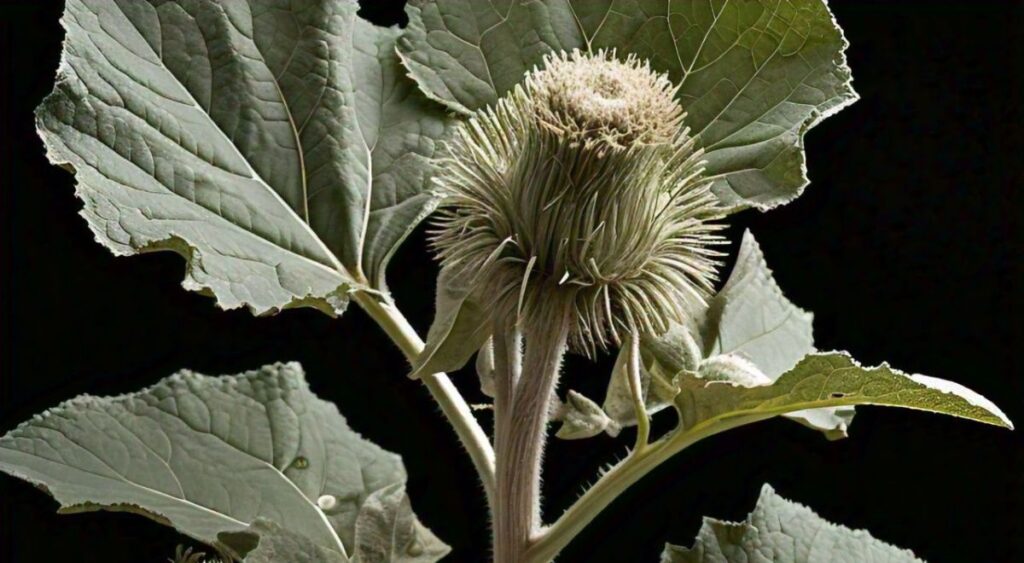Rabbits are herbivores with a diet that consists mainly of fresh hay, vegetables, and leafy greens. As a responsible rabbit owner, you may wonder if certain wild plants, like burdock, are safe for your furry friend to eat. This blog post will answer the question: Can rabbits eat burdock? We’ll also explore related topics to ensure you provide a safe and healthy diet for your rabbit.
Table of Contents
What is Burdock?
Burdock is a biennial plant that grows in various parts of the world. It is known for its large leaves, tall stalks, and sticky burrs that cling to animal fur and clothing. The plant has been used in traditional medicine for centuries and is often consumed by humans for its health benefits. However, can the same plant be given to rabbits?

Burdock Nutritional Value
Burdock roots and leaves are rich in several nutrients, including:
- Fiber
- Antioxidants
- Vitamins C and E
- Potassium
- Magnesium
These nutrients provide health benefits for humans, but it’s important to know whether they are safe and beneficial for rabbits.
Can Rabbits Eat Burdock?
Yes, rabbits can eat burdock in moderation. However, there are a few things to keep in mind before offering this plant to your bunny.
a. Leaves Over Roots:
While burdock roots are commonly consumed by humans, it’s the burdock leaves that are safer for rabbits to eat. The leaves provide some fiber and are low in calories, making them suitable for a rabbit’s diet.
b. Organic Only:
If you plan to give burdock to your rabbit, ensure it is free from pesticides or herbicides. These chemicals can be harmful to rabbits, leading to digestive issues or more serious health problems.
c. Small Quantities:
Like any wild plant, burdock leaves should only be given in small amounts. Too much can upset your rabbit’s delicate digestive system.
d. Monitor Your Rabbit:
Every rabbit is different, and some may react differently to new foods. When introducing burdock, observe your rabbit closely for any signs of discomfort, such as diarrhea or lethargy.
Health Benefits of Burdock for Rabbits
While burdock should not replace your rabbit’s main diet of hay, water, and a balanced mix of vegetables, it can provide some benefits when given occasionally.
- High in Fiber: Burdock leaves contain fiber, which helps support a rabbit’s digestive system and prevents issues like GI stasis.
- Rich in Antioxidants: The antioxidants found in burdock help reduce inflammation and protect cells, contributing to overall health.
- Hydration: The leaves contain water, helping your rabbit stay hydrated, especially during hot weather.
How to Safely Feed Burdock to Your Rabbit
To safely introduce burdock into your rabbit’s diet, follow these steps:
a. Wash Thoroughly:
Before feeding burdock to your rabbit, wash the leaves thoroughly to remove any dirt, insects, or chemicals.
b. Introduce Slowly:
Start by offering a small piece of burdock leaf to see how your rabbit reacts. If they show no adverse effects, you can gradually increase the amount.
c. Combine with Other Greens:
Burdock should be part of a varied diet that includes other rabbit-friendly greens like dandelion leaves, kale, parsley, and romaine lettuce. This ensures a balanced nutrient intake.
d. Avoid Overfeeding:
Remember that the main part of your rabbit’s diet should be fresh hay. Burdock and other greens should make up a small portion of their daily food intake.
Other Wild Plants Rabbits Can Eat
In addition to burdock, there are several other wild plants that are safe for rabbits to eat in moderation. These include:
a. Dandelion Leaves:
Rich in vitamins and calcium, dandelion leaves are a favorite among rabbits.
b. Clover:
Both the leaves and flowers of clover are safe for rabbits and can provide a healthy snack.
c. Plantain Leaves:
High in fiber, plantain leaves are beneficial for a rabbit’s digestive system.
d. Chickweed:
This common plant is safe for rabbits and provides a good source of nutrition.
Plants to Avoid
While burdock and the plants mentioned above are safe for rabbits, there are certain plants that should be avoided at all costs. These include:
- Poisonous Plants: Some common plants, such as lilies, foxglove, nightshade, and buttercups, are toxic to rabbits and can be fatal if consumed.
- Rhubarb: Rhubarb leaves are highly toxic to rabbits and should never be offered.
- Tomato Leaves: The leaves and stems of the tomato plant are poisonous to rabbits, even though the fruit itself is safe in small quantities.
Conclusion
Rabbits can eat burdock, but it should be offered sparingly and only the leaves. The plant provides some nutritional benefits, including fiber and antioxidants, but it should not replace the primary elements of a rabbit’s diet, like hay. Always introduce new plants slowly and monitor your rabbit for any signs of discomfort.
A healthy rabbit diet is diverse, so alongside hay, make sure you offer a range of safe greens and veggies. By doing so, you’ll keep your furry friend happy and healthy!
People Also Ask
Is burdock safe for rabbits?
Yes, burdock is safe for rabbits when given in moderation, specifically the leaves. Avoid giving your rabbit the roots and make sure the plant is free from pesticides.
Can rabbits eat burdock root?
No, it is best to avoid feeding burdock root to rabbits. The leaves are a safer option for occasional feeding.
How much burdock can I give my rabbit?
Start with a small amount, about the size of a leaf or two. If your rabbit tolerates it well, you can give burdock once or twice a week, but ensure it does not become a large part of their diet.
What other wild plants are safe for rabbits to eat?
Rabbits can safely eat wild plants like dandelion, clover, plantain leaves, and chickweed. Always research and introduce wild plants slowly to avoid any health issues.